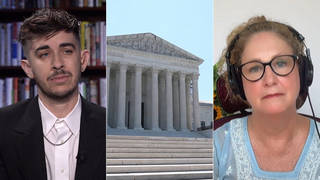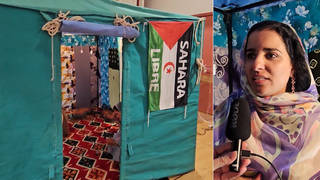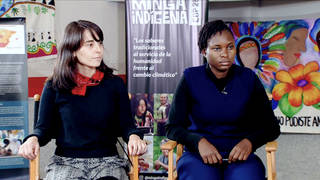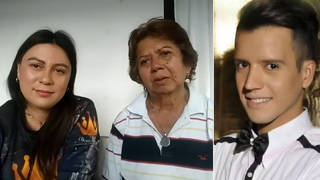
Guests
- Javiera Manzispokesperson for Chile’s largest feminist advocacy group, Coordinadora Feminista 8M.
- Pablo VivancoChilean-born journalist and the former director of teleSUR English.
We get an update from Chile, where an overwhelming majority have voted to rewrite the country’s Pinochet dictatorship-era constitution and tens of thousands poured into the streets to celebrate, just one year after mass protests against social and economic inequalities rocked the country and set it on a path to social reform. Javiera Manzi, a spokesperson for Chile’s largest feminist advocacy group, Coordinadora Feminista 8M, says the referendum is the result of people doing what politicians had refused to do for decades. We also speak with journalist Pablo Vivanco, who says Chile’s neoliberal model has long been held up as an example to follow across Latin America. “Now with this vote … it really sends a signal throughout the region that this selling of the Chilean model and of the neoliberal state is a lie,” Vivanco says.
Transcript
AMY GOODMAN: This is Democracy Now! The Quarantine Report. I’m Amy Goodman, with Juan González, as we turn to Chile, where an overwhelming majority voted to rewrite the Chile’s Pinochet dictatorship-era constitution Sunday. One year after mass protests rocked Chile, many hope the historic referendum will lead to changes in social and economic inequalities, address police brutality, expand access to education, and Indigenous sovereignty. Tens of thousands of people poured into the streets of Santiago and around Chile Sunday evening to celebrate. This is resident María Cecilia Castillo.
MARÍA CECILIA CASTILLO: [translated] I thought it was a historic day that I wouldn’t get to see again in my lifetime. I lived through the yes-or-no referendum and the first presidential election after many years of dictatorship. It seemed to me that participation was very high, and the most important thing is that the newer generations made their voices heard, were up for discussion. Political parties and political associations are now institutionally obsolete, and we all have to understand this. So we have to find new paths. And I think that the youth and social organizations are fundamental for this new era.
AMY GOODMAN: For more on Chile’s historic vote to rewrite the constitution and what happens next, we’re joined by two guests. In Santiago, Javiera Manzi is with us, spokesperson for Chile’s largest feminist advocacy group. And in Toronto, we’re joined by Pablo Vivanco, a Chilean-born journalist, former director of teleSUR English.
We welcome you both to Democracy Now! We’re going to Santiago first, although both of you got to vote, in Chile, as well as in Canada as a Chilean. Javiera Manzi, can you talk about the significance, what led to this vote, and the results of it, what they mean?
JAVIERA MANZI: Yes. Hi, Amy.
Well, first of all, I would like to make a distinction. We finished the constitution that was imposed in 1980 under the dictatorship of Pinochet with a revolt that broke out a year ago, the 18th of October. It wasn’t just a vote. The popular victory that we experienced this October 25th marks two preferences with an absolute majority. We voted for a new constitution, with a majority of 78,2%. And together with that, we voted for a constituent body that will be made up exclusively by members of this — for this function, with a 78,9%.
This is a demonstration of a majority that goes far beyond the margins of all post-dictatorship elections, a margin never before seen in an election in Chile. For us, this vote marks a desire rooted in the revolt that broke out in October. We overthrew a tyrant’s constitution, but not only that. This is a vote that challenges the continuity for more than 30 years of the neoliberalism implanted during the dictatorship with the Chicago Boys’ doctrine shock. Today, we can say that what political parties of the governments of these 30 years didn’t do, the peoples did with a revolt.
Who is behind the option of rejection, who loses with this plebiscite with a 21,7%, those of the 1%, concentrated in three, in the communities of the highest income of the country — in Vitacura, in Providencia, in Lo Barnechea — the same people who voted in 1982 — ’88 yes for the continuity of the dictatorship, those of the 1%, those who are the extreme right, those who concentrate the wealth in Chile. Those are who are behind the other option of rejection. Those are the ones who lost this plebiscite.
JUAN GONZÁLEZ: And, Javiera —
JAVIERA MANZI: One of the main slogans of the revolt — mm-hmm?
JUAN GONZÁLEZ: Javiera, I wanted to ask you what were — could you talk about what were some of the parts of the old constitution that were most objectionable and most hated by the population? Could you talk specifically about what it did to distort the possibility of democracy in Chile?
JAVIERA MANZI: Well, this constitution that was imposed during the dictatorship was done precisely to protect a model. It was a constitution then designed for — with the implementation of neoliberalism in Chile. So the revolt that started and that we have said — we have said that the neoliberalism will start and end in Chile, has a lot to do precisely with this change, with this desire of a radical transformation and with this necessity to change this constitution. In this Constitution, there is a lot of — makes like an institutional framework that has, in all sort of senses, has privatized human social rights. It’s a constitution that also denies for women our right to choose for our own bodies. It’s a constitution that guarantees a state, a subsidiary state, where precisely it’s not human rights, it’s social rights that are in the front, but, other than that, the private accumulation of the few.
So, of course, this is a very important challenge that we are starting now in Chile, a challenge that for us in the social movements, we know that must be held through with constant mobilization, because we know that what starts now, it’s a dispute, an open dispute from different sectors, of course from the ones who are going to try to save the continuity of this model, and from all of those from the revolt and the people who are out nowadays, that we have rights precisely to change everything and in terms of how our lives have been precarized and administrated along these 30 years.
JUAN GONZÁLEZ: We’re also joined by Pablo Vivanco, a Chilean-born journalist and former director of teleSUR English. Welcome to the program, Pablo. Could you talk about — you were able to vote from Canada. And could you talk about how the United States has sold Chile as a neoliberal model in Latin America now for decades, and the impact of this vote?
PABLO VIVANCO: Yeah, absolutely, and myself, along with Chileans from all over the diaspora in the world, a vast majority of which are folks that left because of the dictatorship, people that were forced to flee for their lives, or other folks, like my family, who were forced to flee in the 1980s, fleeing the economy, which had bottomed out and put working people in a situation where they had to leave, you know, which is another thing which is seldom talked about because Chile is, like you said, upheld as a model, not only since its return to civilian government, but also throughout the 1980s.
Neoliberalism was a disaster in Chile, you know, even well before the 1990s or the current day. But yeah, Chile has been upheld throughout the region as the model to follow. It’s been held as, you know, the example that if countries follow market-based reforms, if they allow the private sector to do what it wants, then you’ll achieve some measure of development. And all across Latin America, like in most places that I’ve been to, which is most of the countries in Latin America, invariably you come across people that, you know, when they find out I’m from Chile, they’ll say, “Oh, yeah, Chile is well-off, right?” and compare it to their own country.
Well, now with this vote, where, like Javiera said, close to four in five Chileans voted to reject this model, to reject the institutionalization of neoliberalism through the 1980 constitution, and have now also rejected politicians being the ones to draft the next page in the country’s history, it really sends a signal throughout the region that this selling of the Chilean model and of the neoliberalism, the neoliberal state, is a lie and is something that Chileans know is a lie, Chileans know has failed, and now they’ve come out and said overwhelmingly that they reject it.
AMY GOODMAN: This is Chile’s president, Sebastián Piñera, responding to the landslide vote to rewrite the Pinochet dictatorship-era constitution.
PRESIDENT SEBASTIÁN PIÑERA: [translated] Today, Chileans have freely expressed their will at the ballot box, choosing the option of a constituent constitution, which for the first time will have full equality between men and women, in order to agree on a new constitution for Chile. Today, citizens and democracy have triumphed. Today, unity has prevailed over division, and peace over violence. And this is a triumph for all Chileans who love democracy, unity and peace, without a doubt.
AMY GOODMAN: So, Pablo Vivanco, I wanted to ask you — there you are in Canada, but you did get to vote, and you voted alongside your parents and your aunts and uncles. For people who aren’t familiar with the history of Chile, I mean, you had your own September 11th, September 11th, 1973, when the democratically elected president of Chile died in the palace as the Pinochet forces rose to power. Pinochet would reign for years, thousands of Chileans killed. And then, through Operation Condor, thousands of people around Chile were killed also as a result of the Pinochet dictatorship. Can you talk about how that impacted your family, and what it meant for you to vote with your family, that had gone into exile in Canada?
PABLO VIVANCO: Well, just to clarify, my family wasn’t part of the — my immediate family, that is, my parents and myself, my sisters, weren’t part of the exile community. I grew up around the exile community, and I had various family members who also were forced to leave. My family stayed in Chile. I was born under dictatorship. My mother was working in the hospitals of Santiago, seeing the bodies come in on September 11th.
For obviously myself and my family, as well as the people that I’ve grown up around, my community here, you know, it was very important. It was something that had a lot of symbolic meaning to be able to go out and vote, to finally bury one of the last main remnants of the dictatorship.
And you mentioned September 11th. It should also be noted that this constitution, the one that Chileans now overwhelmingly voted to just rip up, was passed on September 11th, 1980, which is no coincidence. The dictatorship specifically put this plebiscite in 1980, like Javiera said, something that was imposed on Chileans through, you know, a vote. You can’t have a democratic vote under dictatorship. And that’s what the dictatorship did in 1980, September 11th, when they passed this plebiscite, imposed this constitution on Chile.
So, if you look at the diaspora of Chilean émigrés and exiles located in North America or in Europe, Australia, France, Sweden — all the places where the majority of Chileans went to in the 1970s and ’80s, fleeing the human rights abuses and the authoritarianism of the dictatorship or the economic collapse — overwhelmingly, Chileans voted also outside of the country to do away with this constitution and to start a new chapter in the country.
JUAN GONZÁLEZ: And, Javiera, could you talk to us about what this vote means, specifically in terms of grassroots movements, such as the feminist movement, in Chile and also the Indigenous populations of Chile?
JAVIERA MANZI: Well, for a start, what we voted Sunday begins with the first time in the world history that there will be a constitution that will be drafted between men and women in equal basis. This means that for the first time 50% of this constituent organ will be women and the other 50% men. This is historical. And this is a gain of the feminist movement, a gain that has been — because this is the first constituent process that we are holding in South America, in Latin America, in this last cycle of feminist politicization and mobilizations, with the feminist strikes and with all the massive demonstration of feminism as a protagonist of this moment and of this process.
And for us, that is a major concern, because we’re — our major concern now is knowing that it’s not — the 50% of women in this process doesn’t guarantee that feminism will be a protagonist. For us, it’s a necessity that feminism is all — it’s in the institutional process, but also outside in the streets mobilizing this desire and this need for a social transformation. And for us, it’s important to protagonize this process with our demands, with our program, with what we’ve held during the feminist strikes.
For the Mapuche movements today, precisely during these hours, there’s a very important vote that’s being — in the Congress being discussed, because the revolt —
AMY GOODMAN: We just have 10 seconds, Javiera.
JAVIERA MANZI: Yes, revolt in Chile is plurinational revolt. And now there’s the — they are discussing the possibility of Mapuche people and Indigenous people to have a part — to participate in this convention. It’s indispensable for democracy.
AMY GOODMAN: Javiera Manzi, I want to thank you so much for being with us, with the Coordinadora Feminista 8M, and also Pablo Vivanco, speaking to us from Canada. This is Democracy Now! I’m Amy Goodman, with Juan González.













Media Options